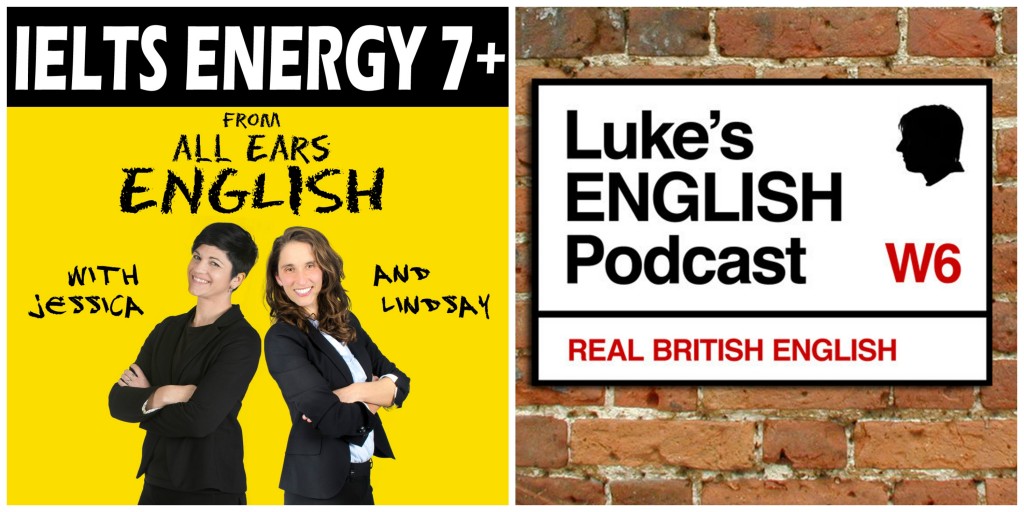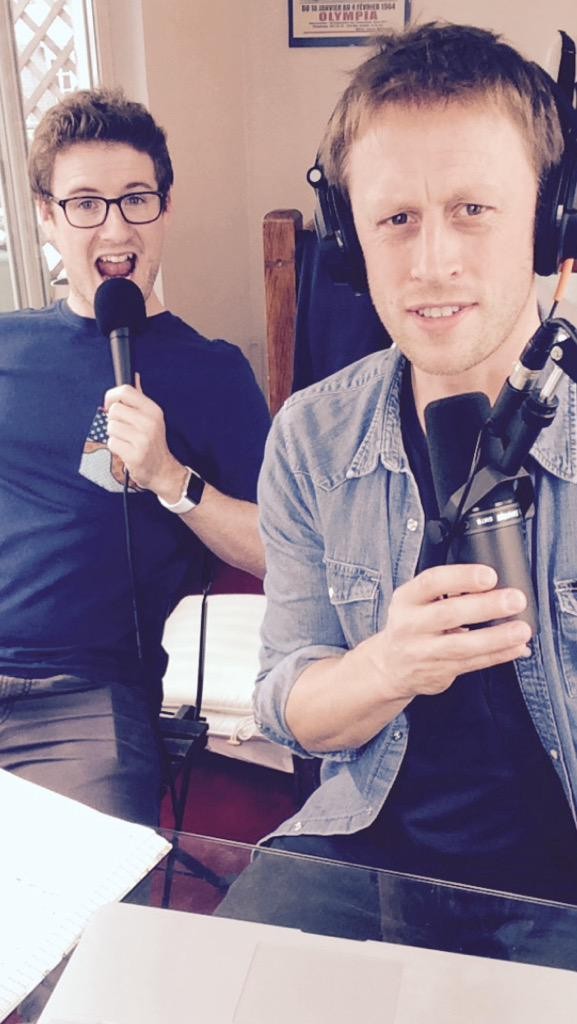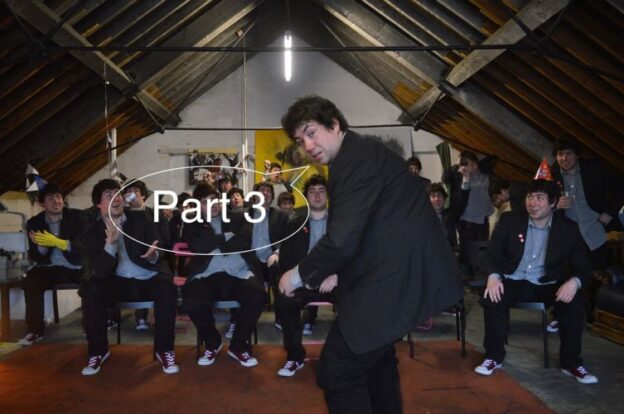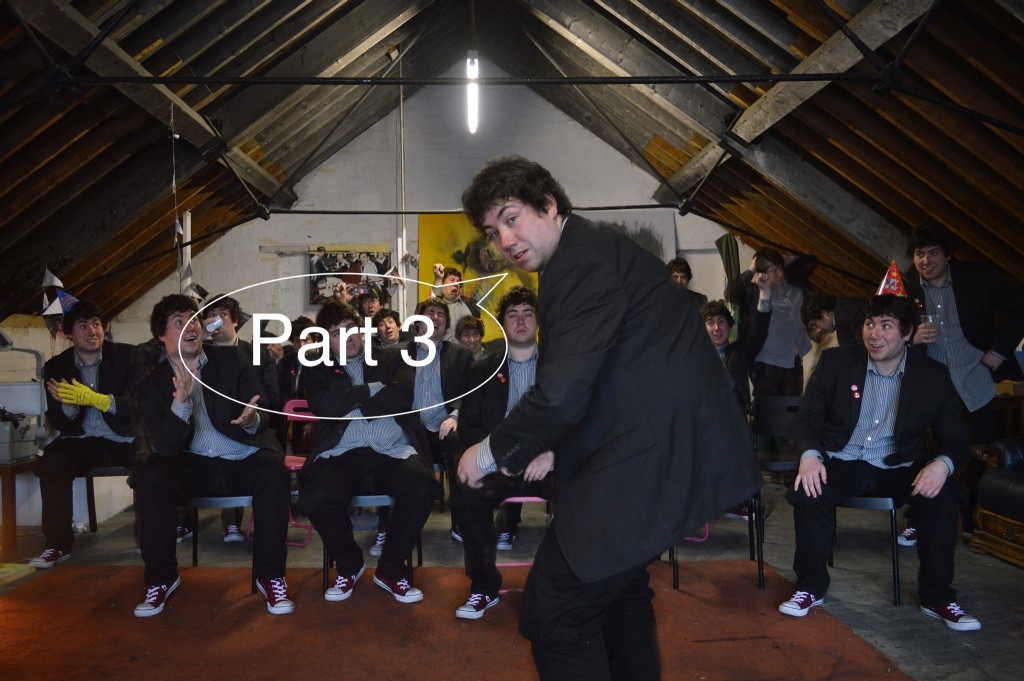Why do people in meetings at work keep talking about “thinking outside the box”? Why does my boss say we need to “get all our ducks in a row”? And why does my project manager want to “touch base with me offline”? If it’s all a mystery to you, don’t worry – LEP is here to decode all this weird language.
If you work in an office in an English-speaking country I’m sure you’ll have heard of ‘corporate jargon’ or ‘management speak’. This is one of the things that people complain about the most, in offices all around the UK. It seems that managers, bosses, project managers, corporate leaders all speak a strange version of English full of bizarre idioms, over-complicated metaphors and unnecessarily big words. But what is ‘management speak’, why do people use it, and why do people find it so annoying? In this episode I’m joined by former Apple employee Paul Taylor as we ‘peel back the onion’ and decode the phenomenon of management speak. Listen to find out all the details and to learn some management speak in the process.
![]() [DOWNLOAD]
[DOWNLOAD]
Intro monologue featuring lots of ‘management speak’ (all explained in part 2)
Hi Paul, thanks for taking time out to talk to me today.
I just wanted to touch base with you in order to get all our ducks in a row, OK, so let’s peel back the onion and have a good look under the bonnet on this podcast situation here. At the end of the day, we’ve brought you on board here because we think you bring a lot to the table and I think that impacts favourably on our key market component players, and I think this is something we can leverage to bring about greater penetration, ultimately pushing our growth potential above and beyond just the low hanging fruit and into the stratosphere on this one. I’m talking streamlining, I’m talking synergy and with yourself on board we can push the strategic staircase all the way up to eleven. I’m talking 110% mate. After all, that’s part of our DNA here at LEP solutions isn’t it. We’re all about cascading relevant information and branching out across new frontiers and web 2.0 platforms and that’s why I thought I’d reach out to you, offline like this, just so we can have a bit of downtime to go over this, get a helicopter view to make sure nobody drops the ball going forward. I think you know what I’m talking about. Feedback says restructuring has been working very well, I mean, clearly this is not a come to Jesus moment, far from it and in fact I think there’s no need for much more of a drill down on this one or it’ll just turn into a case of paralysis by analysis, so let’s keep our eyes on the prize ok Paul? Wait, don’t say anything. I know what you’re thinking, you’re thinking, “but Luke, how can we truly push the envelope and come up with genuinely competitive deliverables across multiple platforms to upscale our market diversity moving forward” and that’s what I like about you Paul. You don’t beat around the bush, you just say it like it is. So, just to finish up here, I’d say – don’t let the grass grow too long on this one, okay, what I’m looking for is for you to have a get together with your team, unpack these issues, have an idea shower, really think outside the box – blue sky thinking, and then by end of play, shoot me over an exit strategy that will allow for true organic growth maximising our potential for upstream stratcom. So, if you could action that, then we’ll just run it up the flagpole, you know, put the record on and see who dances, and then ideally we can look to open the kimono and truly take it to the next level going forward, firing on all cylinders. OK?
Paul says “I have no idea what you’re talking about”
Just… it’s nice to have you on the podcast again.
So, what you all just heard there was me using a lot of what we call “corporate jargon” or “management speak”. If you didn’t understand it all, we plan to come back and explain it for you in this episode. Also, you can see it all written on the page for this episode at teacherluke.co.uk.
Management Speak / Corporate Jargon
We’re talking about management speak, or corporate jargon. That’s the focus of the episode – what is corporate jargon or management speak, how do people feel about it, what’s wrong with it (or not) and what are some of the most common examples of management speak that people don’t like?
Did you understand what I said Paul?
Have you heard that stuff before?
Paul talks about a couple of experiences at Apple.
CNN skit with loads of management speak
What is jargon?
Definition from the Cambridge Dictionary for Learners of English
jargon
noun [U] /ˈdʒɑːɡən/
› words and phrases used by particular groups of people that are difficult for other people to understand:
e.g. legal jargon, technical jargon, medical jargon, English teaching jargon (activate schemata, facilitate the non-deductive process of lexical acquisition, etc), also corporate jargon or just the jargon of managing people.
What is Corporate Jargon or Management Speak?
management speak (or corporate jargon)
noun [U] (also management-speak)
› WORKPLACE words and expressions that are used by managers and in management theory, but may not be understood by ordinary people:
“Relationship marketing” is management speak for selling products by offering discounts and benefits to existing customers.
Corporate jargon is basically the same thing, and just refers to words and expressions used in the corporate world.
Why do people use management speak?
Info about Corporate Jargon from a Guardian article, which includes reference to the Plain English Campaign (a movement which has been going since 1979 to promote plain, simple and clear English free of jargon and misleading public information. It’s been supported by numerous well-known and respected public figures including heads of state such as Tony Blair and Margaret Thatcher, and the Prince of Wales – did I say respected public figures?) Anyway, here is what The Guardian wrote about the subject of management speak.
The Plain English Campaign says that many staff working for big corporate organisations find themselves using management speak as a way of disguising the fact that they haven’t done their job properly. Some people think that it is easy to bluff their way through by using long, impressive-sounding words and phrases, even if they don’t know what they mean, which is telling in itself. (So, people use it to make themselves sound more important)
Furthermore, a recent survey by Institute of Leadership & Management, revealed that management speak is used in almost two thirds (64%) of offices, with nearly a quarter (23%) considering it to be a pointless irritation. “Thinking outside the box” (57%), “going forward” (55%) and “let’s touch base” (39%) were identified as the top three most overused pieces of jargon.
Why does Paul hate it?
Bullsh*t bingo?
Is there anything wrong with it?
Isn’t it just the language of work? People need to use complex language to talk about complex specialist things. But sometimes, it’s used to build power structures and not to achieve tasks. E.g. Legal English in contracts is so difficult to understand that it doesn’t help the parties to the contracts, only the lawyers who are needed to decide it all. So, arguably lawyers (even subconsciously) fill contracts with legalese to make sure they are indispensable to their clients, possibly justifying their very high fees. Similarly, managers might use this language to make themselves sound more important, confident, impressive or expert. This lack of sincerity is what irritates people. It just sounds like self-important BS, and that’s annoying when we’re just trying to get things done.
Arguments For and Against
For: Some phrases are actually pretty useful and accurate and there’s nothing wrong with them really, and it’s just pedantic and uptight to get so annoyed. E.g. “Going forward” is quite descriptive and positive, and is not grammatically incorrect.
Against: But sloppy cliches, impenetrable jargon and meaningless, redundant language does not help proper communication and can just be used to distract attention away from the real work that has to be done. Also, it irritates so many people, and that is a reason alone to look further.
Some comments from an article by Financial Times journalist Lucy Kellaway on management speak (this one http://news.bbc.co.uk/2/hi/uk_news/magazine/7453584.stm#)
Actually, this first one is from the Plain English Campaign Website www.plainenglish.co.uk
‘Human relationships depend on communication. Bad writing is a barrier to communication. When a large organisation such as the Government tries to communicate with the man and woman in the street the scope for misunderstanding is enormous. Too often clarity and simplicity are overwhelmed by pompous words, long sentences and endless paragraphs.
If we all wrote in plain English, how much easier – and efficient – life would be. It is no exaggeration to describe plain English as a fundamental tool of good Government.
Some people think that flowery language and complicated writing is a sign of intellectual strength. They are wrong. Some of our greatest communicators were – and are – passionate believers in the simplicity of the written word. As Winston Churchill described a particularly tortured piece of ‘officialese’: ‘This is the sort of English up with which I will not put.’
The Civil Service and public administration generally have made great strides in the use of plain English in recent years. Jargon and ‘officialese’, while far from extinct, are dying out. I would like to see them banished forever. Plain English must be the aim of all who work in government.’
Baroness Margaret Thatcher, former Prime Minister
No-one wishes to be reactionary and oppose all linguistic evolution; the efforts in France to “protect” their language are absurd and rightly the butt of much ridicule. However, Lucy Kellaway usefully points out how much of these recent changes are intended to deceive and mislead. Most of the phrases are merely empty, but some are deliberately dishonest and designed to distort meaning. (She takes her examples from the business world but this kind of malevolent misuse of language is at the heart of the “political correctness” fanaticism which can be seen in the political and social realms.)
Douglas McCallum, Kingdom of Bahrain (temporary); otherwise, Bullwood, by Dunoon (Agyll)
Many people hate it, but here’s why you still need to know it
If you’re doing business with native speakers, and let’s face it you probably will, you’ll need to try and decode what the hell they’re talking about.
I’ve met many people from lots of countries who do business with the Brits and Americans and they often struggle to penetrate their idiomatic language.
Native speakers should really cut down on it, but it will be useful if you know some of it, or are at least aware that it exists.
So, should management speak and corporate language be banned or something?
That would also be ridiculous. We don’t want a situation like in France, where a bunch of stuffy academics sit around deciding what we can and can’t say. But what we want is to cut out the bullshit factor – people just using language to lie, cover the truth, make themselves sound important or intelligent, to patronise, to be passive aggressive and all those other insincere and slightly dishonest things that people do, via language.
This episode is not just to moan about corporate jargon, but to decode it, help you learn some of it, and also to decide how bad it is really.
List of Jargon & Definitions (Explained in Part 2)
Action = as a verb, to mean “do”. “Can you action that?” (Redundant – why say this when you just mean ‘do’? Sounds self important)
At the end of the day = ultimately (why are things different at the end of the day? And anyway, it’s no the end of the day, it’s 11AM) (Cliche)
Bring to the table = What table? This means to offer skills, services, ideas etc. “What are you bringing to the table?” = what are you bringing to the team in terms of skills, knowledge etc.
Cascading relevant information – speaking to your colleagues. If anything, this is worse than touching base offline. From the flourish of cascading through to relevant, and onto information – this is complete nonsense. It sounds way more self-important than necessary.
a Come-to-Jesus moment (A meeting in which one person has to be disciplined and brought back in line with the philosophy or ethos of the organisation, a meeting or situation in which a person/organisation comes back to core values, often admitting mistakes in the process) Sounds really pretentious.
a Deliverable (a thing that has to be provided) – “the company’s primary method of measuring customer feedback on deliverables” Why not just products, services or information? It sounds annoying because it’s a noun which used to be an adjective. I think it’s not that bad.
Don’t let the grass grow too long on this one = work fast. I’m looking for a polite way of suggesting that you get off your backside and get on with it. What grass anyway? This is just an annoying use of metaphor, obscuring the fact that you’re telling me to hurry up.
Drill down = go into details, investigate the details. Seems unnecessarily aggressive and even overtly sexual?
Drop the Ball = rugby based expression, meaning fail or make a mistake.
End of play = This means by the end of the day, or by the end of the week. I guess it’s used to make it sound like sport or a game, but sorry – it’s work.
Exit strategy = a planned way of exiting a situation (e.g. investors need an exit strategy)
Get all your ducks in a row – be organised and in line with everyone else. You may think I’m disorganised, but there’s no need to talk to me like a five-year-old.
Going forward / Moving forward = in the future
Helicopter view – need a phrase that means broad overview of the business? Then why not say “a broad view of the business” or “an overview”?
Idea shower – brainstorm
Impact – instead of ‘effect’ as a noun. What will be the impact on our sales? How will this impact our sales?
Issues (not problems)
Leverage – used as verb to mean magnify, multiply, augment, or increase.
Look under the bonnet – analyse a situation. Most people wouldn’t have a clue about a car engine. When I look under a car bonnet I scratch my head, try not to look like I haven’t got a clue, jiggle a few pipes and kick the tyres before handing the job over to a qualified professional.
Low hanging fruit – easy win business
Open the kimono = to be open and transparent, usually with external people
Organic growth = naturally occurring development
Outside the box = usually, “think outside the box” – this just means thinking without any restrictions, like ‘blue sky thinking’. But I didn’t realise we were in a box.
Paradigm shift – just a big change in the way we do things.
Paralysis by Analysis = thinking about things too much and not actually doing anything
Part of our DNA = an intrinsic part of our nature, usually the DNA of a company. But companies don’t have DNA.
Peel back the onion = analyse the situation in detail, going through numerous layers.
Penetration = e.g. market penetration. This means going into something deeply. Again, it’s a bit sexual isn’t it.
Push the envelope = make things better, challenge current standards, go further.
Put a record on and see who dances – as above. Unfortunately the kind of person who says this is likely to put on Gangnam Style because they think that’s cool too. Think David Brent to the power 10.
Reach out – as in “I’ll reach out to sales to get the latest figures”.
Restructuring = usually this means firing people or making redundancies, or at least changing the structure of the company and moving people
Run it up the flagpole – Try it and see what happens, or ask for the opinions of everyone, or show it to everyone to get their feedback.
Square the circle – not entirely sure what this means! I think it means to standardise it, get it under control , solve a difficult problem. It comes from geometry – making a square with the same surface area as the circle. It’s difficult, basically.
Strategic Communication (also known as “Stratcom“) = communicating with customers in a planned way. “stratcom” just doesn’t sound like English.
The strategic staircase = a business plan. Thanks, but I’ll take the lift.
to Streamline something / streamlining = like restructuring. A nice way of saying “getting rid of people we don’t need”
Synergy = cooperation of different parts of a business. Different departments working together well.
Touch Base = to talk to someone
Touch base offline – meaning let’s meet and talk, in a more informal setting. Because, contrary to popular belief, it is possible to communicate without a Wi-Fi signal. No, really, it is. Fancy a coffee?
Unpack (as in “Let me unpack that statement.”) = explain and go into details





























